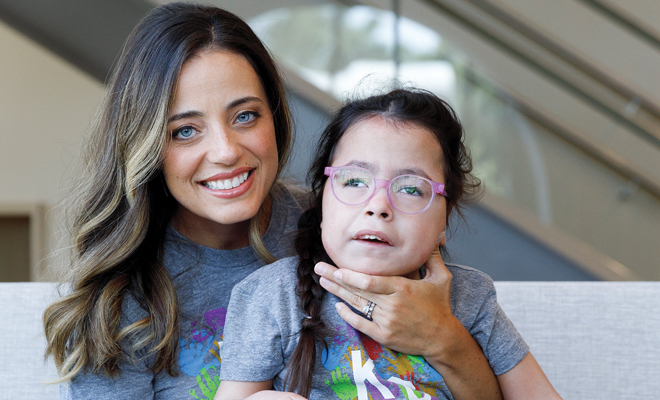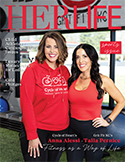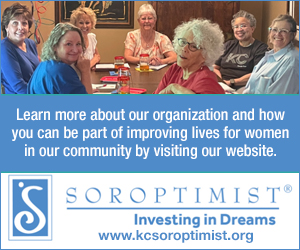 Amber J Deery
Amber J Deery
Christina Tetuan: “Love is love, and there’s always joy.”
Christina Tetuan describes her family as living a life that is beautifully broken. Since birth, her oldest daughter, Florence, has suffered from Ohtahara, a rare epilepsy syndrome seen in newborns and infants. While others can only see the difficulties this horrific disease presents every day, this Olathe, Kansas, family embraces the situation and uses it to focus on a journey to help others.
“I say, ‘Our life is beautifully broken.’ A lot of parents are stuck in the trenches and they can’t see the beauty of their child and this disease because they’re angry, and they’re only listening to the doctors,” noted the young mother. “We went into our delivery day with very normal expectations. After her birth, some of Florence’s vitals looked a little off, but we couldn’t find a source. She progressed into seizures. At that point, she was put on life support. When she was three weeks old, Florence was transferred to Children’s Mercy, and within 24 hours we had a diagnosis of Ohtahara syndrome, which is a terminal disease that’s neurological. They gave us a prognosis of one year.”
Rare and Unexpected
But that was five years ago, and Christina and her beautifully broken family of her husband, Jesse, 18-month-old daughter, Olive, and Florence have outpaced the physicians’ estimations. Ohtahara is usually diagnosed before the child is three months old. It presents itself during the first ten days of life. Looking back, some mothers note they felt their baby seize in the womb around the last trimester. With Ohtahara, the child’s motor and cognitive skills are negatively impacted and can get progressively worse. Possible causes may include brain malformations, metabolic disorders and gene mutations. Because it’s so rare, the root cause may never be known for many children. So many questions go unanswered.
“With Ohtahara, some kids are seizing all of the time on ten different medications, but they don’t need a suction machine like Florence because they can swallow. Some kids can sit up assisted and remain sitting up,” she shared. “Some kids are living on no machines and some kids have to have a lot of machines. Florence is one of those kids who has to have a lot of machines but she’s not seizing. I feel like it’s either-or. The kids are seizing without the machines or they’re on the machines and never seizing. There are very few who aren’t seizing, and Florence is one of the few.”
Like so many other parents of a special needs child, no alarm bells went off during Christina’s pregnancy, which came through IVF. Panels were excellent, indicating no hint of the heartache yet to come. But the labor process wasn’t progressing and monitors noted complications with Florence. Doctor’s took the child by emergency C-section and placed her in neo-natal intensive care.
“She was having odd moments when I was feeding her, and I knew she was having seizures, but the nurses downplayed it. It took five days of convincing doctors Florence was having seizures,” she shared. “They gave her every test under the sun but nothing was coming back. Unfortunately, the hospital didn’t have an EEG machine to test her brain waves.”
Seizure meds were prescribed, and within five minutes of administering them, Florence was coding; her eyes didn’t open for 14 days. She was intubated at just a week old. Two more weeks would pass until she was rushed to Children’s Mercy. Her oxygen levels were at zero, and she was being resuscitated as she was admitted. Meds were switched to ones producing fewer side effects in order to see her brain more active on the EEG. The medical staff tried to prepare the new parents for the worst as Florence’s care stretched into months.
A Fighter
“I kept saying to the doctors, ‘I’m going to know when it’s her time because I’m connected to her. Her brain is sick, but you can’t tell me how sick her brain is.’ If I don’t know definitive answers, I just can’t make those decisions as a parent,” she recalled. “My husband and I fought the hardest we’ve ever fought for anything in our lives during those nine months. We needed to give her a chance at life and let her fight. We owed it to her as parents.”
Defying the odds, Christina and Jesse were finally able to take Florence home. Now the parents shifted their thought processes to giving her the best quality of life during the time they had left with her. The couple has accepted that a miracle cure for Ohtahara most likely will not be discovered, but they’ve vowed to continue their search to find things to help their daughter. Christina notes Florence’s organs are working, she’s not in pain, and at this point, it’s not palliative care.
“Florence’s purpose is beyond her, and it’s my job to be her voice because she can’t talk. I want to help mothers who aren’t educated enough to find Ohtahara research white papers,” she stated. “How can I help them find their voice for their child and themselves? How do I help Florence live her purpose.”
Resilience
Christina has found her voice, and during all this, the nagging doubt and self-absorption of “why me, why us, why her,” has transformed into accepting there is a why that can be converted into a “how to assist others.”
Yet the battle before them is difficult and unknown. Machines give Florence the opportunity to live but her cognitive level is low. The average person might recognize a special needs child connected with tubes, inactive in a stroller, but Christina can see so much more. “I know that my daughter is in there. I say it all the time, especially to the doctors, and people in our family. It’s in her eyes and how she reacts,” commented Christina. “She knows joy and love, and those are the greatest emotions you can ever know. She doesn’t know worldly things, but in a way, she’s living a better life than many others.”
Part of Christina’s outreach for Florence involves a reading program she developed for the kids in her neighborhood called Fiction with Florence. “Kids are expected to read during the summer, and I thought they could read to Florence. I texted other moms that if your child wants to read to her, let me know,” Christina revealed. “We had seven kids and one adult participate. I found myself listening to them read, and Florence was listening, especially when some of the neighborhood boys read; she smiled the whole time.”
More than two years ago, Jesse and Christina decided to add to their family through IVF and Olive was born, a healthy baby, now a 16-month-old. While a toddler demands much attention, Florence requires even more. But Christina and Jesse ensure Olive isn’t overlooked.
“We try to be inclusive with both of them, and Florence’s therapists are good about including Olive by asking her to help with one or two things. She’s not an outcast unless there’s an emergency,” remarked Christina. “It’s easy right now, but when she needs outside activities, it may be different.”
As for other special needs families, Christina notes that doing your research is critically important for you and your child, and you should never be embarrassed to ask for help. She also advises listening to your “gut” because you know your child best. She advised people who don’t have special needs children to act normally when they run across them.
Acceptance
“Very often, I’ll hear, ‘I feel so sorry for you.’ Please don’t feel sorry. Florence isn’t dying. Yes, it’s a delicate situation,” she stated. “Even though she’s five and we’ve been on this journey for so long, you’d think we’d be used to people’s reactions. We’ll be in the park and notice people looking at us because of Florence. Just say, ‘Hi,’ and smile or wave. Just be normal, and do what you would with any other child. While they look different in a wheelchair, special needs kids can hear your comments and they have feelings. They may be hard of hearing and visually impaired but still have feelings. Love is love.”
As for the future, Christina and Jesse will continue to advocate for Florence and other kids with Ohtahara. Given the rarity of the disease, research dollars don’t pour in its direction. “I would hope that for Florence there is some sort of trial for her to be a part of and that more research is funded for treatment and cures,” said Christina. “I hope she continues to feel love, acceptance and joy every day and that she realizes her purpose is being utilized or honored.”
While the journey of care and love for a special needs child can be long with so many twists and turns, the positivity can be immense. Christina reminds us that a drastic change in one’s overall health can occur at any time, on any day, and the enormity of that situation can be felt by unsuspecting people.
“Disease is not discriminatory. It can happen to any of us at any time, and terminal illness can happen to everyone. Most of the time, it’s not anyone’s fault; it’s the cards that we were dealt. But I believe it’s our job to play the hell out of them,” shared Christina. “Never give up on the person or yourself if you’re the one that’s sick. Medicine and treatments can change. Life is a gift, so don’t give up because there’s always hope and joy. Remember, love is love, and just be kind.” ■









